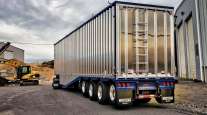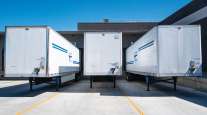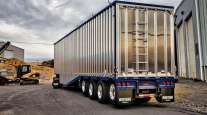Senior Reporter
Trailer Orders Ease; Supply Chain Issues Rise

[Stay on top of transportation news: Get TTNews in your inbox.]
U.S. trailer orders in January were 29,100, up 94% from the same month last year, ACT Research reported, citing manufacturers’ initial data.
The gain comes as open slots for vans largely have disappeared, and labor and supply chain issues threaten steady production, experts said.
A year ago, orders were 14,997, according to ACT.

Maly
This January’s preliminary net total was in line with expectations “as the industry continues to see solid interest from fleets for equipment acquisition,” said Frank Maly, ACT director of commercial vehicle analysis.
David Giesen, vice president of sales at Stoughton Trailers, said, “We are full for 2021,”referring to the company’s backlog of orders.
“We are working on firming up costing of components and supplies to quote early 2022,” he said.
Giesen and others expect production to be strained this year.
We are the 5th largest trailer manufacturer in North America and 9th largest in the world. With orders for 2021 reaching an all time high, we are only continuing to grow! Thank you to our team members for your dedication & our customers for your continued support. #TeamStoughton pic.twitter.com/1a61jjOMAm — Stoughton Trailers (@StoughtonTrlrs) February 17, 2021
He said all components and materials could see shortages.
“Planning ahead of normal, maintaining good communication with suppliers, and ordering ahead will be the key to success,” Giesen said.
FTR pegged preliminary net U.S. trailer orders at 30,000.
At the same time, freight rates remained strong throughout the peak season and continue to remain elevated into 2021, Wabash National Corp. CEO Brent Yeagy said during the company’s fourth-quarter earnings call.
Yeagy said the company’s backlog ended the quarter at $1.5 billion, up sequentially by $500 million from the end of Q3.
Noting a growing trend, he added, “Our largest customers on the truckload side are quickly moving into that middle-mile and final-mile space.”
As #trailer demand continues, year-over-year bookings are up dramatically for the #trucking industry. Manufacturers need more makers to keep up. Great Dane’s EVP of Sales, Chris Hammond, weighs in. #GreatDoesntStophttps://t.co/ldjXJulKTo — Great Dane (@_GreatDane) February 15, 2021
Chris Hammond, Great Dane executive vice president of sales, said the supply chain is a concern but by staying close to its suppliers, the company “thus far has not been too badly affected.”
“It’s a weekly discussion,” he said.
“We have begun to see flatbed customers order over the past several weeks, which bodes well for that sector,” he added.
Great Dane intends to open order boards on all trailers in March for 2022 slots, he said.

Kenney
Hyundai Translead Chief Sales Officer Sean Kenney said he anticipates the “fragility” of the supply chain “will not be short-lived.”
He added that Hyundai Translead does not have any production slots open for vans in 2021. As for 2022, the company is in discussions with customers for planning purposes.
Utility Trailer Manufacturing Co. reported it is building all the trailers it can and needed to hire new employees after it exhausted rehiring of existing employees.
That required more training and time for them to actually contribute to trailer output, slowing the company’s buildup, said Craig Bennett, Utility executive vice president of sales.
It also has meant employee turnover is higher with the new hires compared with existing employees “for the first time in our history,” he said.
Bennett suggested the supply chain is operating at “maybe 80% with shortages and late shipments a weekly occurrence.”
“A few customers are talking about tying up 2022 production capacity with or without pricing [commitments],” he said. “And these would be bigger industry players who want production in Q1 [next year].”
At the same time the trailer maker executives said it was no surprise the market for used trailers was heating up.
“Dealer shops are very busy with repairs and maintenance, and their mechanics are getting harder and harder to find, too,” Bennett said.

What if you could prevent accidents and driver turnover before they happen? In this episode, host Seth Clevenger speaks with two technology CEOs to discuss how machine learning can enable better business decisions and a more proactive stance on safety. Hear a snippet, above, and get the full program by going to RoadSigns.TTNews.com.
Hyundai Translead’s dealer network’s service operations are strong, Kenney said, and “have shared that used equipment in this market is proving very difficult to come by.”
Great Dane’s Hammond said in addition to repairing trailers, buying used equipment and refurbishing those trailers is occurring, too.
In the meantime, Don Ake, vice president of commercial vehicles at FTR, said the list of components in short supply is unusually huge.
He estimated there have been 15 components for which delivery has been spotty.
“This week it’s this one. The next week, here’s the things they have to scramble around for,” he said,
Simply put, there are not enough production workers, Ake said.
Some states have extended unemployment benefits that in some cases are higher than the wages once paid employees now sitting out, he said.
Other high-risk employees with underlying health issues are legitimately fearful about going back to work during the pandemic, he said.
“When you add those two groups together,” Ake said, “in a market where demand for production workers is booming, you get a [labor] shortage.”
He said companies were not going to raise wages to attract them back because they would have to raise the wages of those employees still at work.
“And employers look at this as a short-term issue because at some point the unemployment benefits go away,” Ake said. “And the virus, in effect, goes away if you get enough people vaccinated. [Until then], it becomes this bottleneck, and it’s severe.”
Want more news? Listen to today's daily briefing below or go here for more info:




